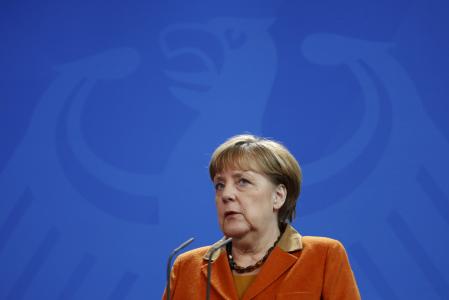
BERLIN (Reuters) – EU leaders on Wednesday welcomed clarity from Britain over what it wants from Brexit talks, with Germany’s Angela Merkel promising a united front in what will be “very intensive” negotiations.
Responding to Prime Minister Theresa May’s speech on Tuesday that made clear that Britain would quit the European Union’s single market, Merkel welcomed the fact that London had accepted that free movement of EU citizens was not something it could opt out of without losing other EU rights.
“There cannot be any cherry picking by Britain in Brexit negotiations,” Merkel told an economic conference, adding that access to the bloc’s single market was ultimately linked to accepting the EU’s four freedoms – of movement of goods, capital, people and services.
“The speech made by British Prime Minister Theresa May has given us a clear impression of how Great Britain wants to proceed,” Merkel said at a joint news conference with Italian Prime Minister Paolo Gentiloni.
“The main thing is that Europe does not let itself be divided and we will make sure of that via very intensive dialogue,” Merkel said.
Gentiloni said the EU was “ready to discuss the issue with the correct approach, which is in solidarity and friendship with the UK”.
A spokesman for the German finance ministry said London’s vision for implementing Brexit could prove to be “pretty complicated” given that Britain would have no “EU passport” to conduct financial transactions once it left the bloc.
“VERY, VERY SHORT TIME”
Swedish Prime Minister Stefan Lofven said he feared the two-year negotiation period, which will begin when Britain launches Article 50 of the EU’s Lisbon Treaty, may not be enough.
“Everybody needs to think through the timetable for these negotiations because in practice we have actually not more than perhaps one-and-a-half years, perhaps a little bit more,” Lofven told reporters at the World Economic Forum in Davos.
“Autumn 2018, that is a very, very short time for these complex negotiations, so I think that the UK … is a bit optimistic (on the) timetable.”
While European Commission President Jean-Claude Juncker said EU negotiators were “not in a hostile mood” toward Britain, Slovakia’s prime minister said the EU had to ensure London did not win a deal that would be to the detriment of the remaining 27 members.
“I am convinced that in no case will a future agreement be more favourable for Great Britain than current membership in the EU,” Robert Fico told a news conference.
“Negotiations over Brexit will be very tough and painful and it would be wrong if (remaining EU members) emerged weaker and Britain stronger.”
(Reporting by Michelle Martin, Gernot Heller, Crispian Balmer and Gavin Jones in Rome, Simon Johnson in Stockholm and Tatiana Jancarikova in Bratislava; Writing by Madeline Chambers; Editing by Robin Pomeroy and Gareth Jones)